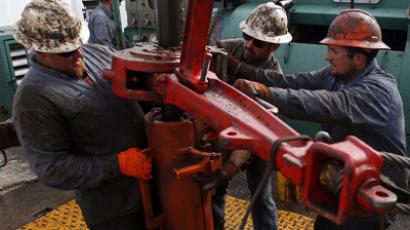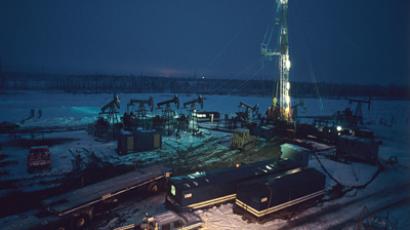'Gas oversupply to push energy prices down this decade'
The commodity cycle has peaked and so have energy prices. With technological innovations taking over, new cheaper sources of energy are appearing, driving prices down, Kingsmill Bond from Citigroup believes.
The shale gas revolution, started in the US, is likely to spread much more widely, dramatically changing global energy markets. This will have two principal consequences, strategist Kingsmill Bond at Citigroup said, speaking with RT Business:“First of all it's the shift of dynamics to the East, but that's less significant from our perspective. The second consequence is that we believe there will be a structural shift to lower energy prices, and of course that has huge implications for the market in Russia.”The Russian government's dependency on oil and gas has increased over the last ten years along with growing prices, turning Russia into more of a petro-state than ever before. But the main concern for the Russian market is that hydrocarbon prices are extremely high. "The fear is that if we've reached a peak and hydrocarbon prices trend downwards, that will definitely have a negative impact on the Russian stock market.” So will the shale gas trend mean disastrous consequences for petro states alike?“We're not talking about the collapse of hydrocarbon prices, we are talking about a gentle drift down – we believe that medium-term prices will not be lower than $70-80. This is a level at which the Russian economy can effectively operate, and the same with gas. We believe that European gas prices will settle at about $9 dollars per mln BTU, which would be a bit negative, but not catastrophic,” Kingsmill Bond reassures. However, the Russian government should review its budget policy and not depend it on high oil prices so much, Mr Bond warns. “That clearly bears risks. It would be sensible to find other buyers for the sale of gas, for example in Asia. It's not wise to believe that the current oil and gas prices will remain the same forever.”Energy prices have passed the point of no return to historic highs, thanks to not only the shale gas revolution, but also other factors. The technological boom is among them and directly affects the demand for traditional energy sources. “And at the same time don't forget that the demand for oil in the OECD, it's now falling and it's been falling for a number of years. We believe that that process will accelerate both as the car fleets become more efficient and gas now takes over as a heavy transport fuel and consequently helps to reduce oil demand in the OECD,” Bond told RT.Falling gas prices drag down oil prices – in the United States the price of natural gas is now just 20% of the price of oil and the trend is likely to continue. The reason behind this is the economic incentive for oil consumers to make a switch to gas.“What we now see is a significant shift in the US trucking industry to use natural gas-powered trucks. We expect that by the end of the decade one third of the US trucking industry would have switched from diesel to natural gas. That's just one country but that's around 1.6 million barrels per day,” Kingsmill explains. “It's symptomatic for wider shifts, for example shipping, railways, all heavy transport – we believe that all of them will shift away from expensive oil to much cheaper natural gas.”














